外研版英语中考语法专项——形容词与副词 知识梳理+实战演练(含答案)
文档属性
| 名称 | 外研版英语中考语法专项——形容词与副词 知识梳理+实战演练(含答案) | 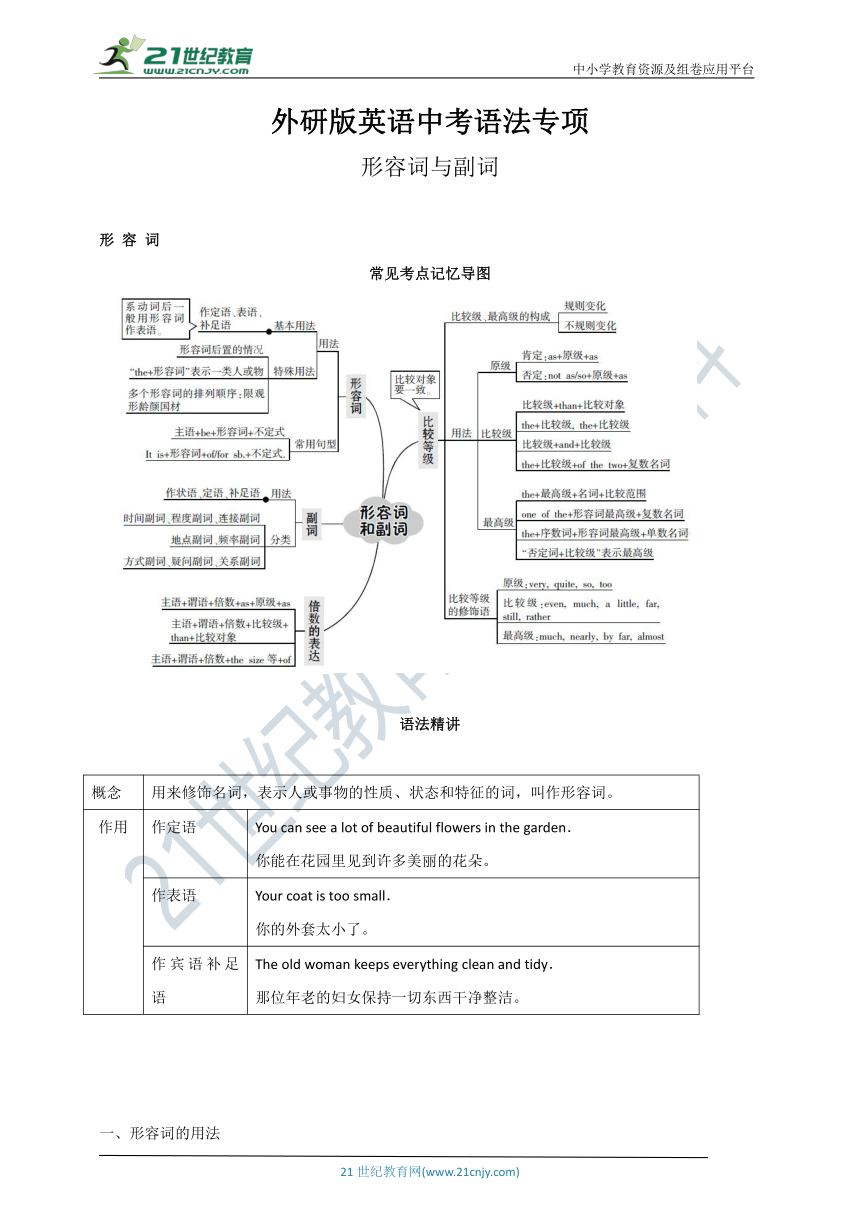 | |
| 格式 | doc | ||
| 文件大小 | 1.5MB | ||
| 资源类型 | 试卷 | ||
| 版本资源 | 外研版 | ||
| 科目 | 英语 | ||
| 更新时间 | 2022-02-08 20:56:17 | ||
图片预览

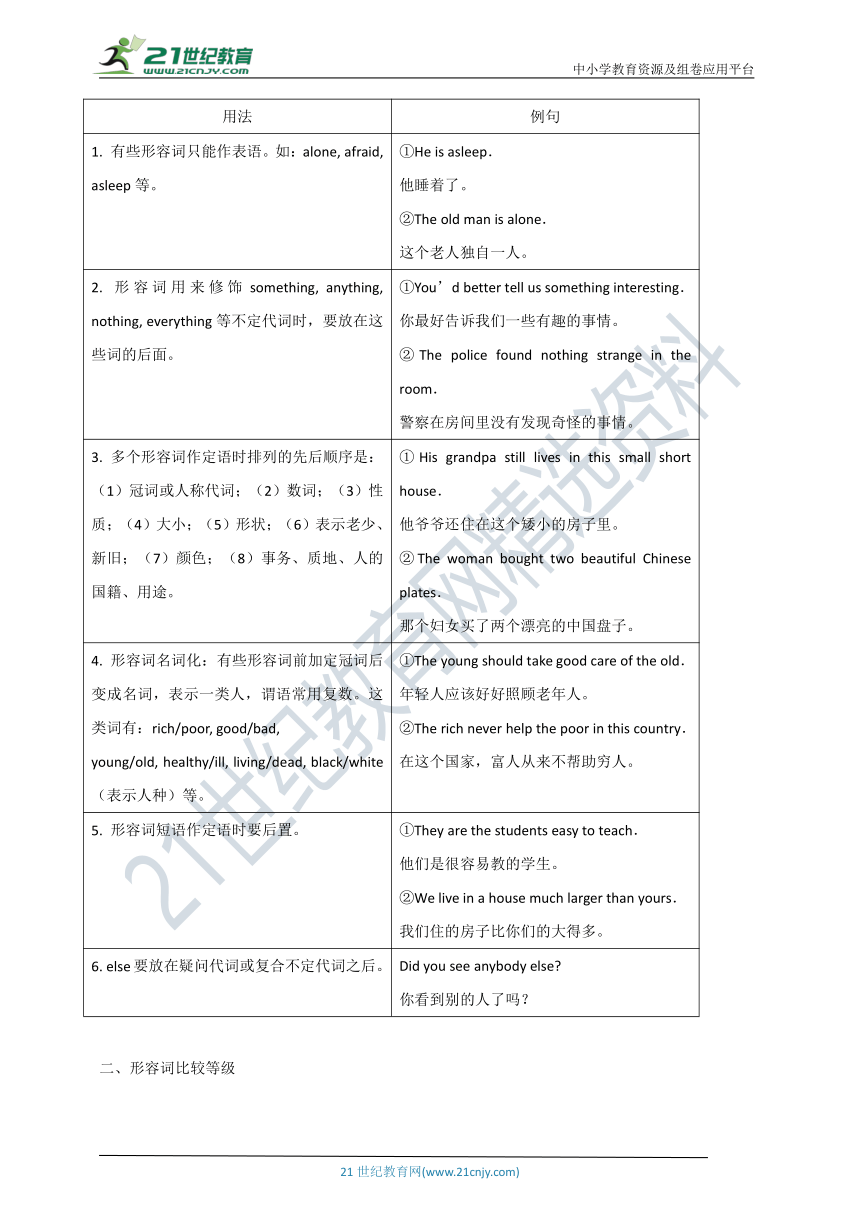
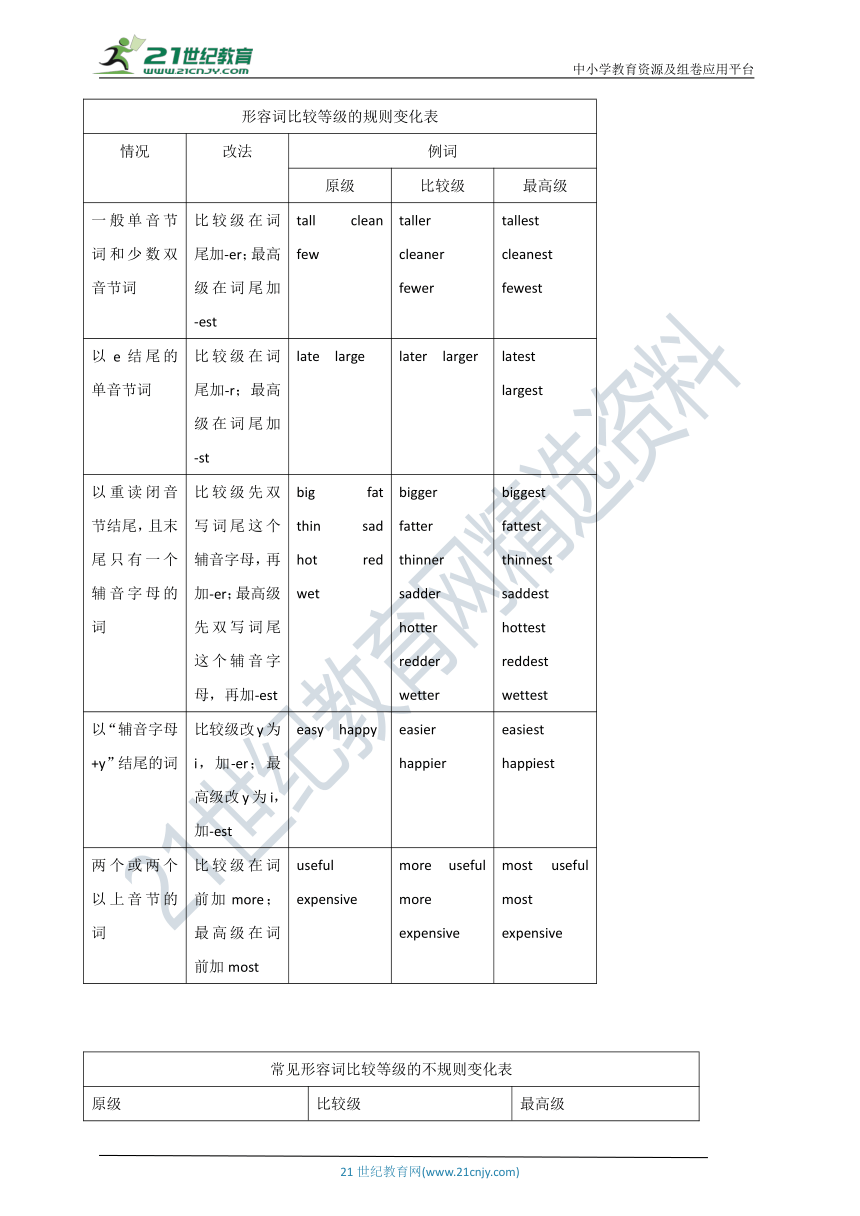
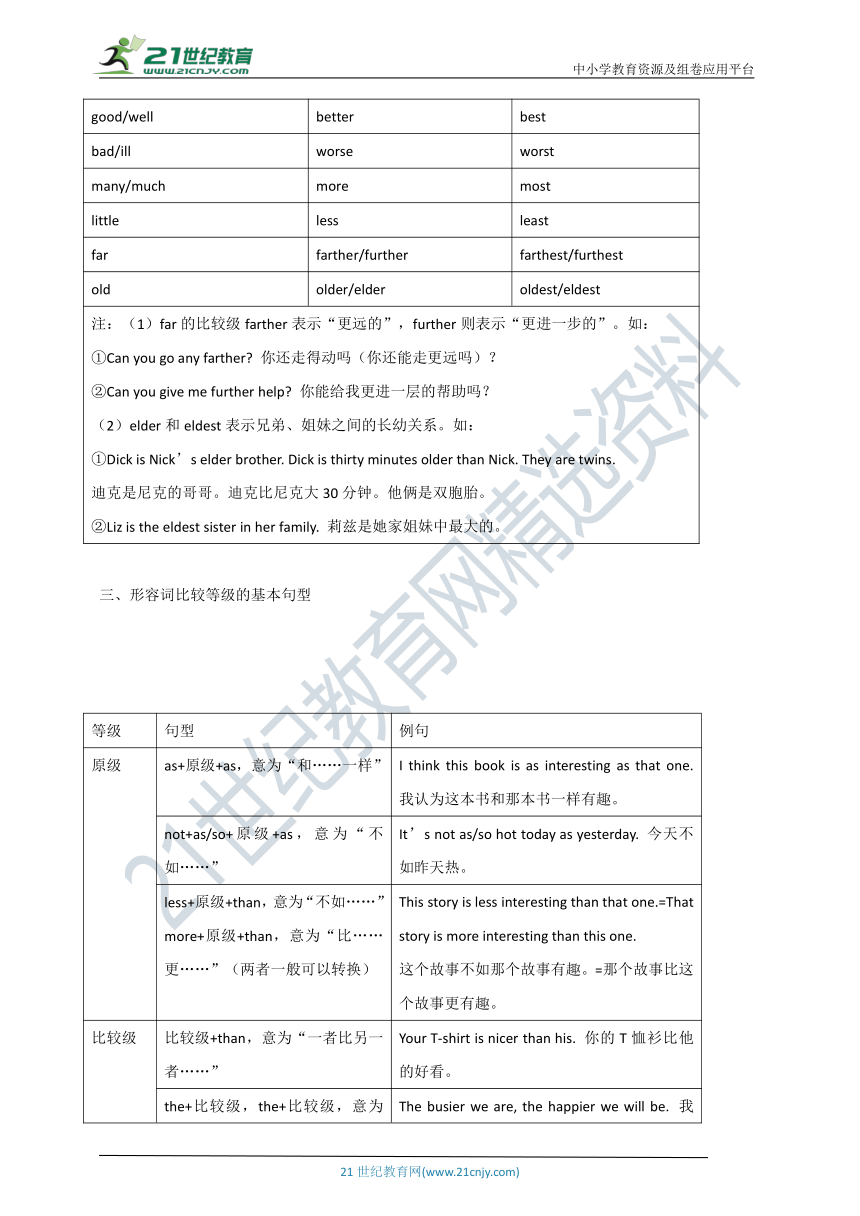
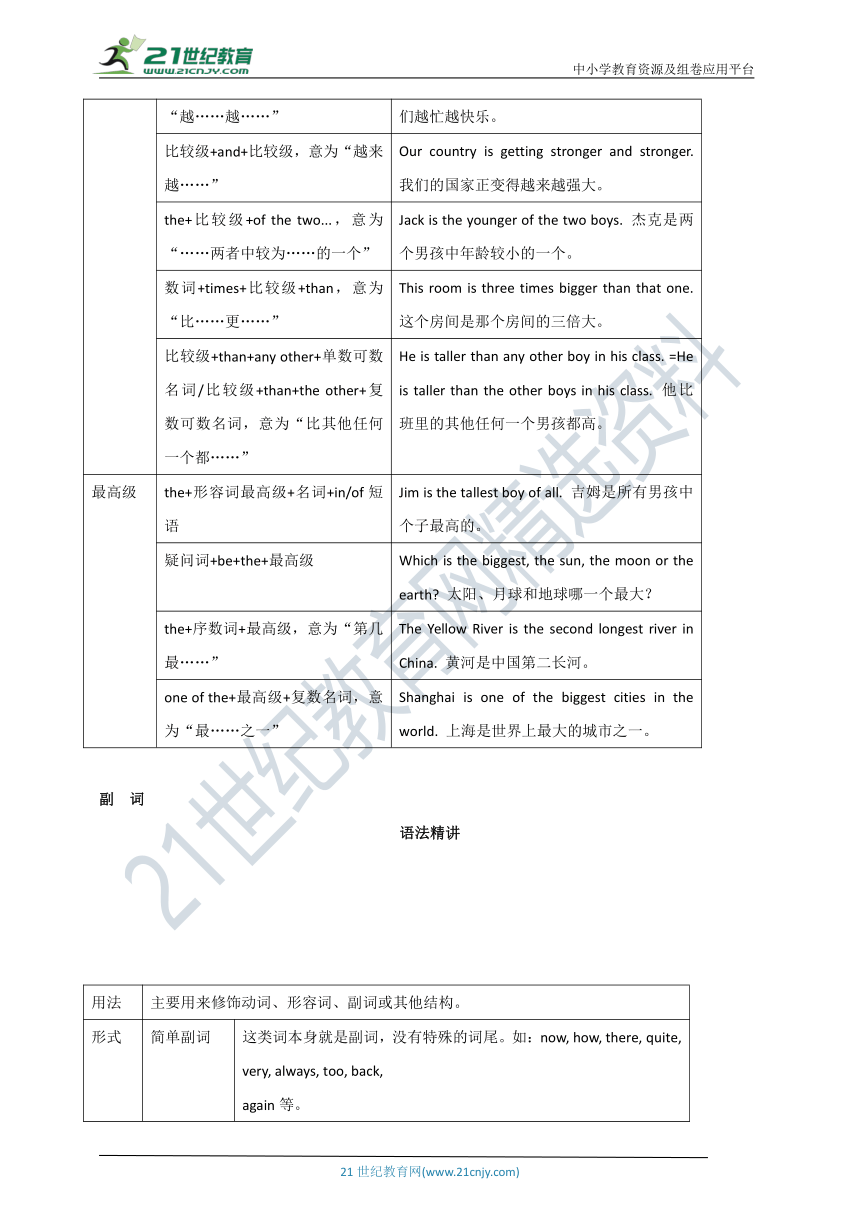
文档简介
中小学教育资源及组卷应用平台
外研版英语中考语法专项
形容词与副词
形 容 词
常见考点记忆导图
语法精讲
概念 用来修饰名词,表示人或事物的性质、状态和特征的词,叫作形容词。
作用 作定语 You can see a lot of beautiful flowers in the garden.你能在花园里见到许多美丽的花朵。
作表语 Your coat is too small.你的外套太小了。
作宾语补足语 The old woman keeps everything clean and tidy.那位年老的妇女保持一切东西干净整洁。
一、形容词的用法
用法 例句
1. 有些形容词只能作表语。如:alone, afraid, asleep等。 ①He is asleep.他睡着了。②The old man is alone.这个老人独自一人。
2. 形容词用来修饰something, anything, nothing, everything等不定代词时,要放在这些词的后面。 ①You’d better tell us something interesting.你最好告诉我们一些有趣的事情。②The police found nothing strange in the room.警察在房间里没有发现奇怪的事情。
3. 多个形容词作定语时排列的先后顺序是:(1)冠词或人称代词;(2)数词;(3)性质;(4)大小;(5)形状;(6)表示老少、新旧;(7)颜色;(8)事务、质地、人的国籍、用途。 ①His grandpa still lives in this small short house.他爷爷还住在这个矮小的房子里。②The woman bought two beautiful Chinese plates.那个妇女买了两个漂亮的中国盘子。
4. 形容词名词化:有些形容词前加定冠词后变成名词,表示一类人,谓语常用复数。这类词有:rich/poor, good/bad,young/old, healthy/ill, living/dead, black/white(表示人种)等。 ①The young should take good care of the old.年轻人应该好好照顾老年人。②The rich never help the poor in this country.在这个国家,富人从来不帮助穷人。
5. 形容词短语作定语时要后置。 ①They are the students easy to teach.他们是很容易教的学生。②We live in a house much larger than yours.我们住的房子比你们的大得多。
6. else要放在疑问代词或复合不定代词之后。 Did you see anybody else 你看到别的人了吗?
二、形容词比较等级
形容词比较等级的规则变化表
情况 改法 例词
原级 比较级 最高级
一般单音节词和少数双音节词 比较级在词尾加-er;最高级在词尾加-est tall clean few taller cleaner fewer tallest cleanest fewest
以e结尾的单音节词 比较级在词尾加-r;最高级在词尾加-st late large later larger latest largest
以重读闭音节结尾,且末尾只有一个辅音字母的词 比较级先双写词尾这个辅音字母,再加-er;最高级先双写词尾这个辅音字母,再加-est big fat thin sad hot red wet bigger fatter thinner sadder hotter redder wetter biggest fattest thinnest saddest hottest reddest wettest
以“辅音字母+y”结尾的词 比较级改y为i,加-er;最高级改y为i,加-est easy happy easier happier easiest happiest
两个或两个以上音节的词 比较级在词前加more;最高级在词前加most useful expensive more useful more expensive most useful most expensive
常见形容词比较等级的不规则变化表
原级 比较级 最高级
good/well better best
bad/ill worse worst
many/much more most
little less least
far farther/further farthest/furthest
old older/elder oldest/eldest
注:(1)far的比较级farther表示“更远的”,further则表示“更进一步的”。如:①Can you go any farther 你还走得动吗(你还能走更远吗)?②Can you give me further help 你能给我更进一层的帮助吗?(2)elder和eldest表示兄弟、姐妹之间的长幼关系。如:①Dick is Nick’s elder brother. Dick is thirty minutes older than Nick. They are twins. 迪克是尼克的哥哥。迪克比尼克大30分钟。他俩是双胞胎。②Liz is the eldest sister in her family. 莉兹是她家姐妹中最大的。
三、形容词比较等级的基本句型
等级 句型 例句
原级 as+原级+as,意为“和……一样” I think this book is as interesting as that one. 我认为这本书和那本书一样有趣。
not+as/so+原级+as,意为“不如……” It’s not as/so hot today as yesterday. 今天不如昨天热。
less+原级+than,意为“不如……”more+原级+than,意为“比……更……”(两者一般可以转换) This story is less interesting than that one.=That story is more interesting than this one.这个故事不如那个故事有趣。=那个故事比这个故事更有趣。
比较级 比较级+than,意为“一者比另一者……” Your T-shirt is nicer than his. 你的T恤衫比他的好看。
the+比较级,the+比较级,意为“越……越……” The busier we are, the happier we will be. 我们越忙越快乐。
比较级+and+比较级,意为“越来越……” Our country is getting stronger and stronger. 我们的国家正变得越来越强大。
the+比较级+of the two...,意为“……两者中较为……的一个” Jack is the younger of the two boys. 杰克是两个男孩中年龄较小的一个。
数词+times+比较级+than,意为“比……更……” This room is three times bigger than that one. 这个房间是那个房间的三倍大。
比较级+than+any other+单数可数名词/比较级+than+the other+复数可数名词,意为“比其他任何一个都……” He is taller than any other boy in his class. =He is taller than the other boys in his class. 他比班里的其他任何一个男孩都高。
最高级 the+形容词最高级+名词+in/of短语 Jim is the tallest boy of all. 吉姆是所有男孩中个子最高的。
疑问词+be+the+最高级 Which is the biggest, the sun, the moon or the earth 太阳、月球和地球哪一个最大?
the+序数词+最高级,意为“第几最……” The Yellow River is the second longest river in China. 黄河是中国第二长河。
one of the+最高级+复数名词,意为“最……之一” Shanghai is one of the biggest cities in the world. 上海是世界上最大的城市之一。
副 词
语法精讲
用法 主要用来修饰动词、形容词、副词或其他结构。
形式 简单副词 这类词本身就是副词,没有特殊的词尾。如:now, how, there, quite, very, always, too, back,again等。
由形容词+-ly构成的副词 这些词多数是方式副词。如:bravely, quickly, quietly, carefully, gladly, slowly, deeply, clearly, firmly, angrily等。注意特殊变化:simple→simply comfortable→comfortably terrible→terribly possible→possiblytrue→truly
与形容词同形的副词 earlyan early bus早班车go to school early上学早 hardhard work艰辛的工作study hard努力学习enoughenough money足够的钱big enough足够大 latebe late for school上学迟到go to bed late睡觉迟
作用 1. 用在形容词或其他副词前。如:①I know him quite well. 我对他很熟悉。②She is quite interested in English. 她对英语很感兴趣。2. 修饰动词,表示时间、地点、方式、频率等。如:①He went into the room quietly. 他悄悄地走进了房间。②They often go skating in winter. 冬天他们经常去滑冰。3. 修饰整个句子。如:Luckily, they won the game. 很幸运,他们赢了这场比赛。4. 用在名词后作定语。如:①Look at the trees there. 看那儿的那些树。②The young people here all like football. 这儿的年轻人都喜欢足球。5. 作宾语补足语。如:I saw her out with her parents. 我看见她跟她父母一起出去了。
位置 1. 副词修饰动词时,一般放在动词的后面;若是修饰及物动词,则放在宾语之后。如:Tom does his homework carefully. 汤姆做功课很细心。2. 频度副词often, always, usually, never以及just, really, suddenly, still等,通常放在实义动词之前,情态动词、助动词或连系动词be之后。如:①They always get up very early. 他们总是起得很早。②Li Ping is often late for school. 李平经常上学迟到。3. 副词修饰形容词或其他副词时,放在被修饰词之前。如:This problem is too difficult. 这个问题太难了。注:副词enough通常放在被修饰词之后。如:My brother isn’t old enough to go to school. 我弟弟还不到上学的年龄。4. 如果一个句子里同时出现有表示时间、地点的副词作状语时,通常是先地点、后时间。如:①He worked in Qingdao last year. 他去年在青岛工作。②I was born in Wuhan in 1976. 我于1976年出生于武汉。5. 当多个时间副词连用时一般把较具体的时间放在前面,较笼统的时间放在后面。如:My uncle will leave forShanghai at 7 o’clock in the morning tomorrow. 我叔叔明天早晨7点将去上海。6. 为了强调动作发生的时间,有些副词可置于句首,如once, yesterday, tomorrow, soon, now, usually等。如:①Yesterday we all went to the park. 昨天我们都去公园了。②Usually we get on very well with each other. 通常我们彼此相处得都很好。7. 有少数副词在句中的位置非常灵活,常放在与它关系最密切的词前,如only, even等。如:①He can only read. He can’t write. 他只会读,不会写。②Only I have been there. They haven’t been there. 只有我去过那儿。他们没去过。
续表
比较等级 1. 副词比较级和最高级大多数是在词前加more和most。只有少数几个副词,如quick, fast, slow, early等是在词尾加-er和-est。如:①They run faster than before. 他们比以前跑得快。②He got to school earliest in his class. 在他的班里他到校最早。2. 副词比较等级的用法与形容词比较等级的用法基本相同,但副词最高级前的定冠词the可有可无。如:The boy writes (the) most carefully of the four. 那个男孩是四个人当中写得最认真的。3. 不规则副词的比较级和最高级:well→better→best, badly→worse→worst, little→less→least, much→more→most, far→farther/further→farthest/furthest
易混淆的同源副词 1. high 高地——highly 高度地2. deep 深深地——deeply 很,非常;深刻地3. wide 充分地——widely 广泛地4. just 正好——justly 公正地5. near 近地——nearly 几乎;差不多6. hard 努力地——hardly 几乎不 7. free 免费——freely 自由地8. late 迟;晚——lately 最近;近来9. most 最——mostly 通常;主要地10. pretty 相当地——prettily 优美地11. close 接近地——closely 密切地;紧密地
实战演练
一、用方框中所给词的适当形式填空,每词限用一次
fresh soft especial patience nearly complete main
1. (温州市龙湾区模拟)—Wow, what nice tomatoes!Would you please sell me some
—Sorry, I grow them______________ for the use of my family. But I can give you some if you like.
2. (绍兴中考)It was______________ one o’clock, but she still didn’t show up.
3. (南京)Helen treats her students in a______________ and understanding way.
4. (连云港)I’m sorry. I______________ forgot that it was your birthday yesterday.
5. (宁波)This kind of silk feels much______________ than that one.
6. —I think winter is a beautiful season,______________ when it snows.
—Me, too.
7. (宿迁)—Shall we go outside and breathe some______________ air
—Good ideas.
二、用所给词的适当形式填空
1. The more fruit and vegetables you eat, the______________(healthy) you will be.
2. My time in the middle school was one of______________(exciting) periods of my life.
3. Many students are______________ (happy) with too much homework. They need more time for their hobbies.
4. —Why are you looking______________ (sleep) in class all day
—Because I can’t finish my homework until eleven every night.
5. The leaders believed______________ (strong) that the purpose of the program was to give young overseas Chinese a chance to learn more about themselves.
6. Wei Fang is very young, but she draws as______________(good) as her brother.
7. Jane listens______________ (careful) in her class.
参考答案
第29课 形容词与副词
实战演练
一、1. mainly 2. nearly 3. patient 4. completely 5. softer
6. especially 7. fresh
二、1. healthier 2. the most exciting 3. unhappy 4. sleepy
5. strongly 6. well 7. (the) most carefully
21世纪教育网 www.21cnjy.com 精品试卷·第 2 页 (共 2 页)
HYPERLINK "http://21世纪教育网(www.21cnjy.com)
" 21世纪教育网(www.21cnjy.com)
外研版英语中考语法专项
形容词与副词
形 容 词
常见考点记忆导图
语法精讲
概念 用来修饰名词,表示人或事物的性质、状态和特征的词,叫作形容词。
作用 作定语 You can see a lot of beautiful flowers in the garden.你能在花园里见到许多美丽的花朵。
作表语 Your coat is too small.你的外套太小了。
作宾语补足语 The old woman keeps everything clean and tidy.那位年老的妇女保持一切东西干净整洁。
一、形容词的用法
用法 例句
1. 有些形容词只能作表语。如:alone, afraid, asleep等。 ①He is asleep.他睡着了。②The old man is alone.这个老人独自一人。
2. 形容词用来修饰something, anything, nothing, everything等不定代词时,要放在这些词的后面。 ①You’d better tell us something interesting.你最好告诉我们一些有趣的事情。②The police found nothing strange in the room.警察在房间里没有发现奇怪的事情。
3. 多个形容词作定语时排列的先后顺序是:(1)冠词或人称代词;(2)数词;(3)性质;(4)大小;(5)形状;(6)表示老少、新旧;(7)颜色;(8)事务、质地、人的国籍、用途。 ①His grandpa still lives in this small short house.他爷爷还住在这个矮小的房子里。②The woman bought two beautiful Chinese plates.那个妇女买了两个漂亮的中国盘子。
4. 形容词名词化:有些形容词前加定冠词后变成名词,表示一类人,谓语常用复数。这类词有:rich/poor, good/bad,young/old, healthy/ill, living/dead, black/white(表示人种)等。 ①The young should take good care of the old.年轻人应该好好照顾老年人。②The rich never help the poor in this country.在这个国家,富人从来不帮助穷人。
5. 形容词短语作定语时要后置。 ①They are the students easy to teach.他们是很容易教的学生。②We live in a house much larger than yours.我们住的房子比你们的大得多。
6. else要放在疑问代词或复合不定代词之后。 Did you see anybody else 你看到别的人了吗?
二、形容词比较等级
形容词比较等级的规则变化表
情况 改法 例词
原级 比较级 最高级
一般单音节词和少数双音节词 比较级在词尾加-er;最高级在词尾加-est tall clean few taller cleaner fewer tallest cleanest fewest
以e结尾的单音节词 比较级在词尾加-r;最高级在词尾加-st late large later larger latest largest
以重读闭音节结尾,且末尾只有一个辅音字母的词 比较级先双写词尾这个辅音字母,再加-er;最高级先双写词尾这个辅音字母,再加-est big fat thin sad hot red wet bigger fatter thinner sadder hotter redder wetter biggest fattest thinnest saddest hottest reddest wettest
以“辅音字母+y”结尾的词 比较级改y为i,加-er;最高级改y为i,加-est easy happy easier happier easiest happiest
两个或两个以上音节的词 比较级在词前加more;最高级在词前加most useful expensive more useful more expensive most useful most expensive
常见形容词比较等级的不规则变化表
原级 比较级 最高级
good/well better best
bad/ill worse worst
many/much more most
little less least
far farther/further farthest/furthest
old older/elder oldest/eldest
注:(1)far的比较级farther表示“更远的”,further则表示“更进一步的”。如:①Can you go any farther 你还走得动吗(你还能走更远吗)?②Can you give me further help 你能给我更进一层的帮助吗?(2)elder和eldest表示兄弟、姐妹之间的长幼关系。如:①Dick is Nick’s elder brother. Dick is thirty minutes older than Nick. They are twins. 迪克是尼克的哥哥。迪克比尼克大30分钟。他俩是双胞胎。②Liz is the eldest sister in her family. 莉兹是她家姐妹中最大的。
三、形容词比较等级的基本句型
等级 句型 例句
原级 as+原级+as,意为“和……一样” I think this book is as interesting as that one. 我认为这本书和那本书一样有趣。
not+as/so+原级+as,意为“不如……” It’s not as/so hot today as yesterday. 今天不如昨天热。
less+原级+than,意为“不如……”more+原级+than,意为“比……更……”(两者一般可以转换) This story is less interesting than that one.=That story is more interesting than this one.这个故事不如那个故事有趣。=那个故事比这个故事更有趣。
比较级 比较级+than,意为“一者比另一者……” Your T-shirt is nicer than his. 你的T恤衫比他的好看。
the+比较级,the+比较级,意为“越……越……” The busier we are, the happier we will be. 我们越忙越快乐。
比较级+and+比较级,意为“越来越……” Our country is getting stronger and stronger. 我们的国家正变得越来越强大。
the+比较级+of the two...,意为“……两者中较为……的一个” Jack is the younger of the two boys. 杰克是两个男孩中年龄较小的一个。
数词+times+比较级+than,意为“比……更……” This room is three times bigger than that one. 这个房间是那个房间的三倍大。
比较级+than+any other+单数可数名词/比较级+than+the other+复数可数名词,意为“比其他任何一个都……” He is taller than any other boy in his class. =He is taller than the other boys in his class. 他比班里的其他任何一个男孩都高。
最高级 the+形容词最高级+名词+in/of短语 Jim is the tallest boy of all. 吉姆是所有男孩中个子最高的。
疑问词+be+the+最高级 Which is the biggest, the sun, the moon or the earth 太阳、月球和地球哪一个最大?
the+序数词+最高级,意为“第几最……” The Yellow River is the second longest river in China. 黄河是中国第二长河。
one of the+最高级+复数名词,意为“最……之一” Shanghai is one of the biggest cities in the world. 上海是世界上最大的城市之一。
副 词
语法精讲
用法 主要用来修饰动词、形容词、副词或其他结构。
形式 简单副词 这类词本身就是副词,没有特殊的词尾。如:now, how, there, quite, very, always, too, back,again等。
由形容词+-ly构成的副词 这些词多数是方式副词。如:bravely, quickly, quietly, carefully, gladly, slowly, deeply, clearly, firmly, angrily等。注意特殊变化:simple→simply comfortable→comfortably terrible→terribly possible→possiblytrue→truly
与形容词同形的副词 earlyan early bus早班车go to school early上学早 hardhard work艰辛的工作study hard努力学习enoughenough money足够的钱big enough足够大 latebe late for school上学迟到go to bed late睡觉迟
作用 1. 用在形容词或其他副词前。如:①I know him quite well. 我对他很熟悉。②She is quite interested in English. 她对英语很感兴趣。2. 修饰动词,表示时间、地点、方式、频率等。如:①He went into the room quietly. 他悄悄地走进了房间。②They often go skating in winter. 冬天他们经常去滑冰。3. 修饰整个句子。如:Luckily, they won the game. 很幸运,他们赢了这场比赛。4. 用在名词后作定语。如:①Look at the trees there. 看那儿的那些树。②The young people here all like football. 这儿的年轻人都喜欢足球。5. 作宾语补足语。如:I saw her out with her parents. 我看见她跟她父母一起出去了。
位置 1. 副词修饰动词时,一般放在动词的后面;若是修饰及物动词,则放在宾语之后。如:Tom does his homework carefully. 汤姆做功课很细心。2. 频度副词often, always, usually, never以及just, really, suddenly, still等,通常放在实义动词之前,情态动词、助动词或连系动词be之后。如:①They always get up very early. 他们总是起得很早。②Li Ping is often late for school. 李平经常上学迟到。3. 副词修饰形容词或其他副词时,放在被修饰词之前。如:This problem is too difficult. 这个问题太难了。注:副词enough通常放在被修饰词之后。如:My brother isn’t old enough to go to school. 我弟弟还不到上学的年龄。4. 如果一个句子里同时出现有表示时间、地点的副词作状语时,通常是先地点、后时间。如:①He worked in Qingdao last year. 他去年在青岛工作。②I was born in Wuhan in 1976. 我于1976年出生于武汉。5. 当多个时间副词连用时一般把较具体的时间放在前面,较笼统的时间放在后面。如:My uncle will leave forShanghai at 7 o’clock in the morning tomorrow. 我叔叔明天早晨7点将去上海。6. 为了强调动作发生的时间,有些副词可置于句首,如once, yesterday, tomorrow, soon, now, usually等。如:①Yesterday we all went to the park. 昨天我们都去公园了。②Usually we get on very well with each other. 通常我们彼此相处得都很好。7. 有少数副词在句中的位置非常灵活,常放在与它关系最密切的词前,如only, even等。如:①He can only read. He can’t write. 他只会读,不会写。②Only I have been there. They haven’t been there. 只有我去过那儿。他们没去过。
续表
比较等级 1. 副词比较级和最高级大多数是在词前加more和most。只有少数几个副词,如quick, fast, slow, early等是在词尾加-er和-est。如:①They run faster than before. 他们比以前跑得快。②He got to school earliest in his class. 在他的班里他到校最早。2. 副词比较等级的用法与形容词比较等级的用法基本相同,但副词最高级前的定冠词the可有可无。如:The boy writes (the) most carefully of the four. 那个男孩是四个人当中写得最认真的。3. 不规则副词的比较级和最高级:well→better→best, badly→worse→worst, little→less→least, much→more→most, far→farther/further→farthest/furthest
易混淆的同源副词 1. high 高地——highly 高度地2. deep 深深地——deeply 很,非常;深刻地3. wide 充分地——widely 广泛地4. just 正好——justly 公正地5. near 近地——nearly 几乎;差不多6. hard 努力地——hardly 几乎不 7. free 免费——freely 自由地8. late 迟;晚——lately 最近;近来9. most 最——mostly 通常;主要地10. pretty 相当地——prettily 优美地11. close 接近地——closely 密切地;紧密地
实战演练
一、用方框中所给词的适当形式填空,每词限用一次
fresh soft especial patience nearly complete main
1. (温州市龙湾区模拟)—Wow, what nice tomatoes!Would you please sell me some
—Sorry, I grow them______________ for the use of my family. But I can give you some if you like.
2. (绍兴中考)It was______________ one o’clock, but she still didn’t show up.
3. (南京)Helen treats her students in a______________ and understanding way.
4. (连云港)I’m sorry. I______________ forgot that it was your birthday yesterday.
5. (宁波)This kind of silk feels much______________ than that one.
6. —I think winter is a beautiful season,______________ when it snows.
—Me, too.
7. (宿迁)—Shall we go outside and breathe some______________ air
—Good ideas.
二、用所给词的适当形式填空
1. The more fruit and vegetables you eat, the______________(healthy) you will be.
2. My time in the middle school was one of______________(exciting) periods of my life.
3. Many students are______________ (happy) with too much homework. They need more time for their hobbies.
4. —Why are you looking______________ (sleep) in class all day
—Because I can’t finish my homework until eleven every night.
5. The leaders believed______________ (strong) that the purpose of the program was to give young overseas Chinese a chance to learn more about themselves.
6. Wei Fang is very young, but she draws as______________(good) as her brother.
7. Jane listens______________ (careful) in her class.
参考答案
第29课 形容词与副词
实战演练
一、1. mainly 2. nearly 3. patient 4. completely 5. softer
6. especially 7. fresh
二、1. healthier 2. the most exciting 3. unhappy 4. sleepy
5. strongly 6. well 7. (the) most carefully
21世纪教育网 www.21cnjy.com 精品试卷·第 2 页 (共 2 页)
HYPERLINK "http://21世纪教育网(www.21cnjy.com)
" 21世纪教育网(www.21cnjy.com)
同课章节目录
- 词法
- 名词
- 动词和动词短语
- 动词语态
- 动词时态
- 助动词和情态动词
- 非谓语动词
- 冠词
- 代词
- 数词和量词
- 形容词副词及其比较等级
- 介词和介词短语
- 连词和感叹词
- 构词法
- 相似、相近词比较
- 句法
- 陈述句
- 一般疑问句和否定疑问句
- 特殊疑问句及选择疑问句
- 反意疑问句
- 存在句(There be句型)
- 宾语从句
- 定语从句
- 状语从句
- 主谓一致问题
- 简单句
- 并列句
- 复合句
- 主谓一致
- 主、表语从句
- 名词性从句
- 直接引语和间接引语
- 虚拟语气
- 感叹句
- 强调句
- 倒装句
- 祈使句
- 句子的成分
- 句子的分类
- 题型专区
- 单项选择部分
- 易错题
- 完形填空
- 阅读理解
- 词汇练习
- 听说训练
- 句型转换
- 补全对话
- 短文改错
- 翻译
- 书面表达
- 任务型阅读
- 语法填空
- 其他资料
